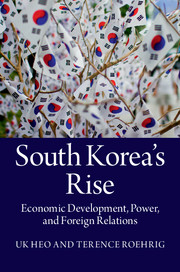Book contents
- Frontmatter
- Dedication
- Contents
- List of figures
- List of tables
- Acknowledgements
- 1 Introduction
- 2 Economic development, state power, and foreign policy
- 3 Inter-Korean relations: confrontation, economic exchanges, and the nuclear crisis
- 4 South Korea and the United States: from dependency to partnership
- 5 South Korea, Russia, and China: from adversaries to economic partners
- 6 South Korea and Japan: an ambivalent relationship
- 7 South Korea and the European Union: evolving cooperation and competition
- 8 South Korea and India: opportunities and obstacles
- 9 South Korea and the developing world: Africa, Latin America, the Middle East, and Southeast Asia
- 10 Contributing to the international community: from consumer to producer
- 11 Conclusion
- Bibliography
- Index
- References
1 - Introduction
Published online by Cambridge University Press: 05 July 2014
- Frontmatter
- Dedication
- Contents
- List of figures
- List of tables
- Acknowledgements
- 1 Introduction
- 2 Economic development, state power, and foreign policy
- 3 Inter-Korean relations: confrontation, economic exchanges, and the nuclear crisis
- 4 South Korea and the United States: from dependency to partnership
- 5 South Korea, Russia, and China: from adversaries to economic partners
- 6 South Korea and Japan: an ambivalent relationship
- 7 South Korea and the European Union: evolving cooperation and competition
- 8 South Korea and India: opportunities and obstacles
- 9 South Korea and the developing world: Africa, Latin America, the Middle East, and Southeast Asia
- 10 Contributing to the international community: from consumer to producer
- 11 Conclusion
- Bibliography
- Index
- References
Summary
The relationship between politics and economics is one of the oldest issues studied in both political science and economics. It has been widely examined and the general conclusion is that they have a significant impact on each other. For instance, the modernization perspective maintains that economic development usually leads to the transition to democracy, although people will also tolerate authoritarian governments in exchange for economic prosperity. At the same time, the types of government/regime have different implications for economic growth. Some scholars argue that democracy may be beneficial for economic growth thanks to its political stability and protection of individual property rights, which in turn enhance private investment. Others contend that democracy is potentially harmful because of the likely activity of interest groups who prioritize their parochial interests ahead of the national interest. In addition politics influences the economy through resource allocation, including tax policies, defense budgets, social welfare programs, and stock market performance. Economic performance also affects voting behavior, elections, and foreign policy. In fact, economic behavior, such as increased trade and foreign direct investment, is believed to be able to reduce the possibility of international conflict. Thus, the intertwined relationship between politics and economics is well established in the literature.
However, previous studies on the politics–economics nexus have focused on the relationship between economic development and democratization, the defense–growth connection, the link between regime types and economic performance, and the association between the economy and voting behavior. As a result, there is a void in the literature when it comes to the question of how economic development affects a country’s foreign relations, with the exception of studies on the relationship between trade and interstate conflict. Economic development can influence a country’s foreign policy behavior in a number of ways because as a nation develops its economy, changes in domestic politics occur and citizens expect more from the government.
- Type
- Chapter
- Information
- South Korea's RiseEconomic Development, Power, and Foreign Relations, pp. 1 - 9Publisher: Cambridge University PressPrint publication year: 2014



